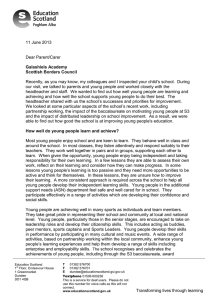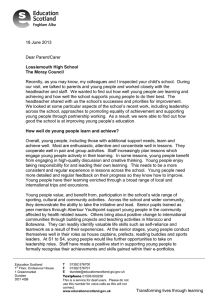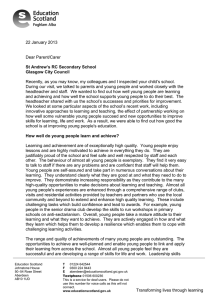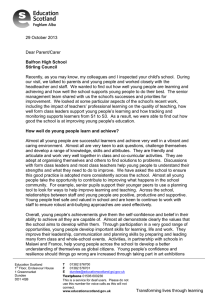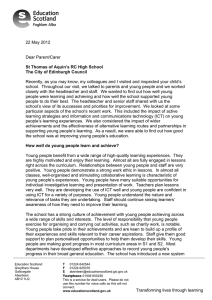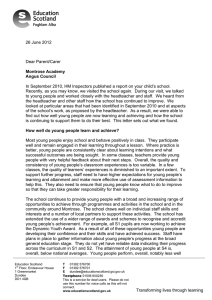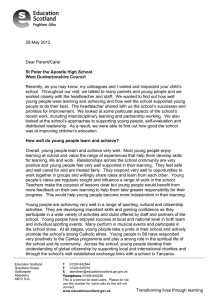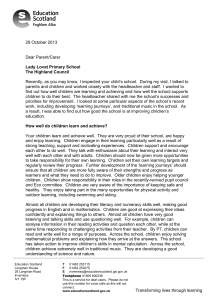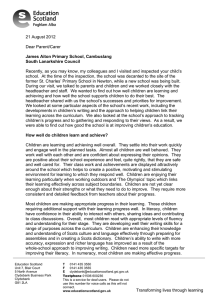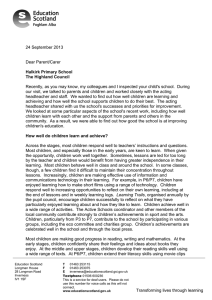19 March 2013 Dear Parent/Carer
advertisement
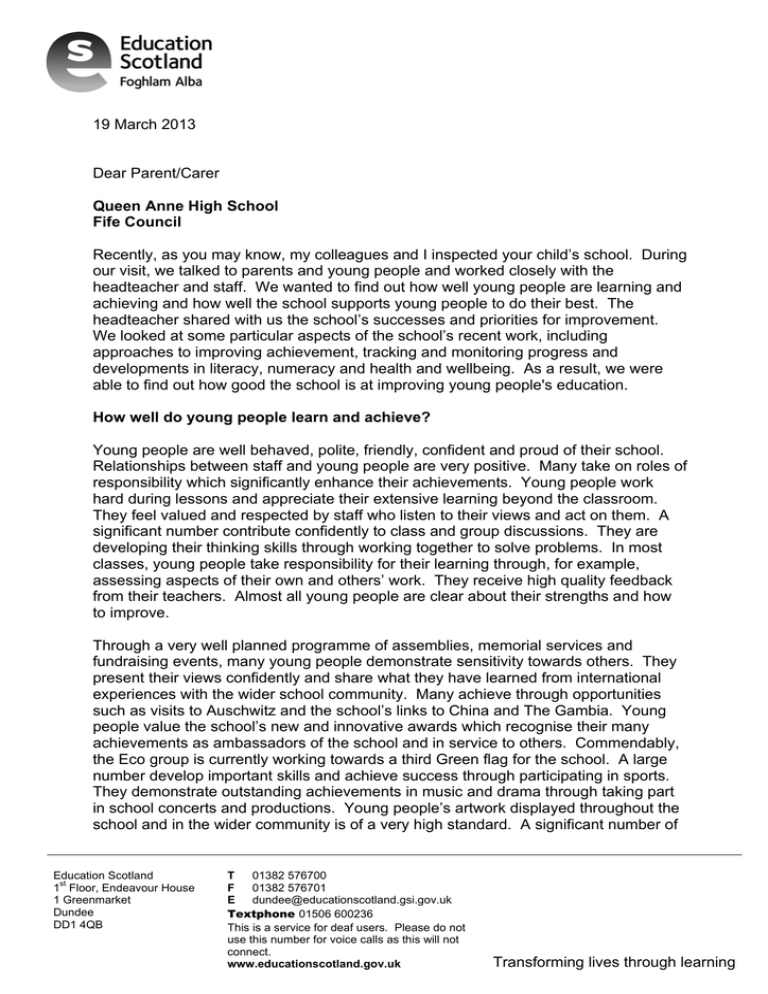
19 March 2013 Dear Parent/Carer Queen Anne High School Fife Council Recently, as you may know, my colleagues and I inspected your child’s school. During our visit, we talked to parents and young people and worked closely with the headteacher and staff. We wanted to find out how well young people are learning and achieving and how well the school supports young people to do their best. The headteacher shared with us the school’s successes and priorities for improvement. We looked at some particular aspects of the school’s recent work, including approaches to improving achievement, tracking and monitoring progress and developments in literacy, numeracy and health and wellbeing. As a result, we were able to find out how good the school is at improving young people's education. How well do young people learn and achieve? Young people are well behaved, polite, friendly, confident and proud of their school. Relationships between staff and young people are very positive. Many take on roles of responsibility which significantly enhance their achievements. Young people work hard during lessons and appreciate their extensive learning beyond the classroom. They feel valued and respected by staff who listen to their views and act on them. A significant number contribute confidently to class and group discussions. They are developing their thinking skills through working together to solve problems. In most classes, young people take responsibility for their learning through, for example, assessing aspects of their own and others’ work. They receive high quality feedback from their teachers. Almost all young people are clear about their strengths and how to improve. Through a very well planned programme of assemblies, memorial services and fundraising events, many young people demonstrate sensitivity towards others. They present their views confidently and share what they have learned from international experiences with the wider school community. Many achieve through opportunities such as visits to Auschwitz and the school’s links to China and The Gambia. Young people value the school’s new and innovative awards which recognise their many achievements as ambassadors of the school and in service to others. Commendably, the Eco group is currently working towards a third Green flag for the school. A large number develop important skills and achieve success through participating in sports. They demonstrate outstanding achievements in music and drama through taking part in school concerts and productions. Young people’s artwork displayed throughout the school and in the wider community is of a very high standard. A significant number of Education Scotland 1st Floor, Endeavour House 1 Greenmarket Dundee DD1 4QB T 01382 576700 F 01382 576701 E dundee@educationscotland.gsi.gov.uk Textphone 01506 600236 This is a service for deaf users. Please do not use this number for voice calls as this will not connect. www.educationscotland.gov.uk Transforming lives through learning young people across the school and particularly in the senior years are effective leaders and very positive role models for their peers. Over the past five years, the school has consistently raised attainment in some areas and maintained a high level of attainment in others. Almost all young people in S1 to S3 are making appropriate progress across the curriculum. The school’s approaches to tracking and monitoring their progress are exemplary. As a result, they build very well on their previous achievements in primary school and throughout their school years. In S4 to S6, young people’s performance in national examinations is significantly above the national average. Young people perform consistently better than those in schools serving young people with similar needs and backgrounds. Of those who experience difficulty with their learning, most achieve well and leave school with a range of qualifications. The school is very successful in achieving positive destinations for young people. How well does the school support young people to develop and learn? Staff know and care for the young people very well. Almost all teachers plan lessons effectively. They include tasks and activities which take appropriate account of varying learning needs and abilities. Young people with individual needs are very well supported during most lessons. Staff are proactive in seeking expertise from other professionals to ensure individual needs are assessed and met. A very good lunchtime club provides vulnerable learners with a nurturing environment and increases their confidence. Across the school, there are high levels of supported study from many staff who readily give of their own time to support young people’s learning. Pupil support staff liaise closely with primary colleagues to ensure a smooth transition from P7 to S1. The school’s curriculum provides a wide range of opportunities at all stages for young people to develop the skills for learning, work and life in line with Curriculum for Excellence. From S1 to S3, courses and programmes increasingly link their learning across subjects and improve literacy and numeracy. Staff are proactive in deepening young people’s understanding of the importance of health and wellbeing. This is reflected in the very positive ethos and strong values-based culture of the school. At all stages, there are many rich opportunities for learning beyond the classroom. The array of clubs and activities across the school includes hand-bell ringing, Chinese cookery and the school orchestra. Young people in the senior school experience a curriculum which suits their interests, needs and abilities. The school is increasing opportunities for vocational learning in S4 to S6 so that senior pupils who value their school experience are better encouraged to stay. Through effective consultation with parents and the wider community, the school has clear plans for further curriculum development. How well does the school improve the quality of its work? As a result of outstanding leadership by the headteacher and very high levels of professional commitment by staff at all levels, the school has significantly improved the quality of its work over a sustained period of time. Senior managers work very well together and with the wider school community to create a climate of high expectations and continual improvement. Staff work in departments and across the school on 2 activities which enable them to reflect on their work and secure improvement. They value the high levels of support and challenge they receive from the senior management team. The school involves the young people and parents well in discussions about improvement and change. Partners within the wider community increasingly engage with the school to enhance the curriculum and evaluate the school’s work. The school has a very clear sense of shared vision and purpose. This inspection found the following key strengths. • • • • The outstanding leadership of the headteacher. Sustained improvements in young people’s attainment and achievement. Teachers’ involvement in improving young people’s learning experiences and in implementing Curriculum for Excellence. Young people’s exemplary attitudes to learning and their developing skills and attributes which prepare them well for life beyond school. We discussed with staff and the education authority how they might continue to improve the school. This is what we agreed with them. • Continue to develop partnerships to secure further implementation of Curriculum for Excellence and to evaluate the work of the school. What happens at the end of the inspection? We are very satisfied with the overall quality of provision. We are confident that the school’s self-evaluation processes are leading to improvements. As a result, we will make no further evaluative visits in connection with this inspection. During the inspection, we identified aspects of innovative practice which we would like to explore further in order to share the practice with others. As a result we will work with the school and local authority in order to record and share more widely the innovative practice. We will ask the school, in discussion with the local authority, to let parents know the outcome of the innovative practice visit(s). Patricia Watson HM Inspector Additional inspection evidence, such as details of the quality indicator evaluations, for your school can be found on the Education Scotland website http://www.educationscotland.gov.uk/inspectionandreview/reports/school/primsec/Que enAnneHighSchoolFife.asp If you would like to receive this report in a different format, for example, in a translation please contact the administration team on the above telephone number. If you want to give us feedback or make a complaint about our work, please contact us by telephone on 0141 282 5000, or e-mail: complaints@educationscotland.gsi.gov.uk or write to us addressing your letter to the Complaints Manager, Denholm House, Almondvale Business Park, Livingston EH54 6GA. 3
